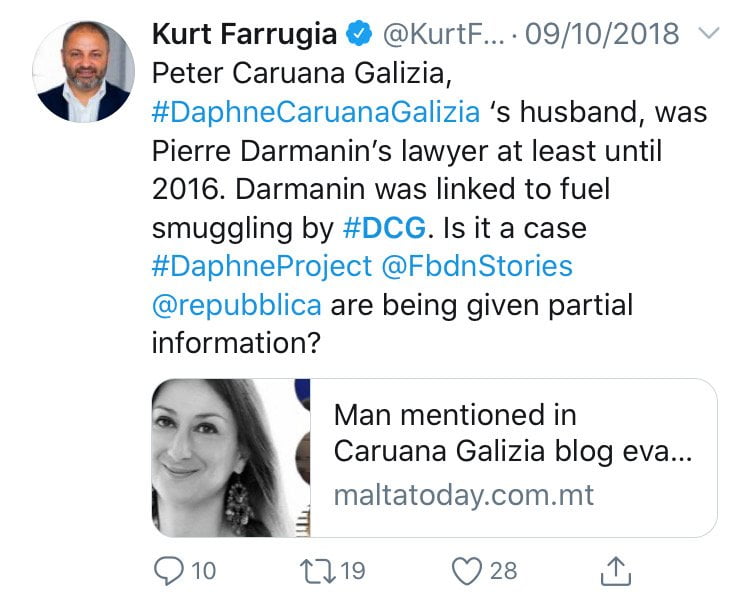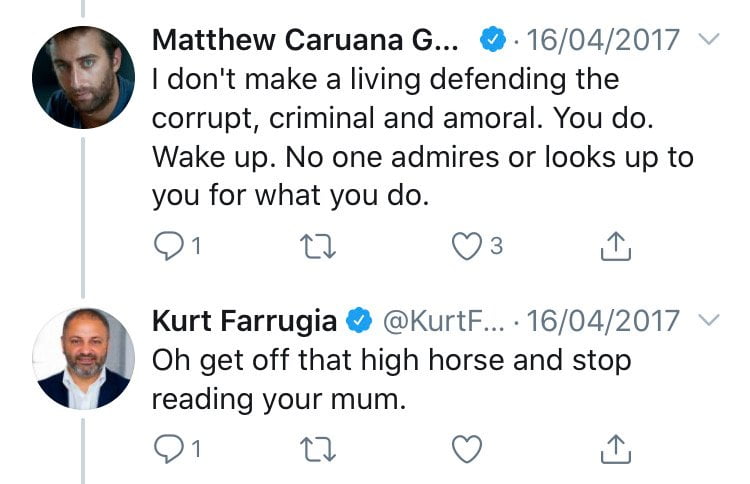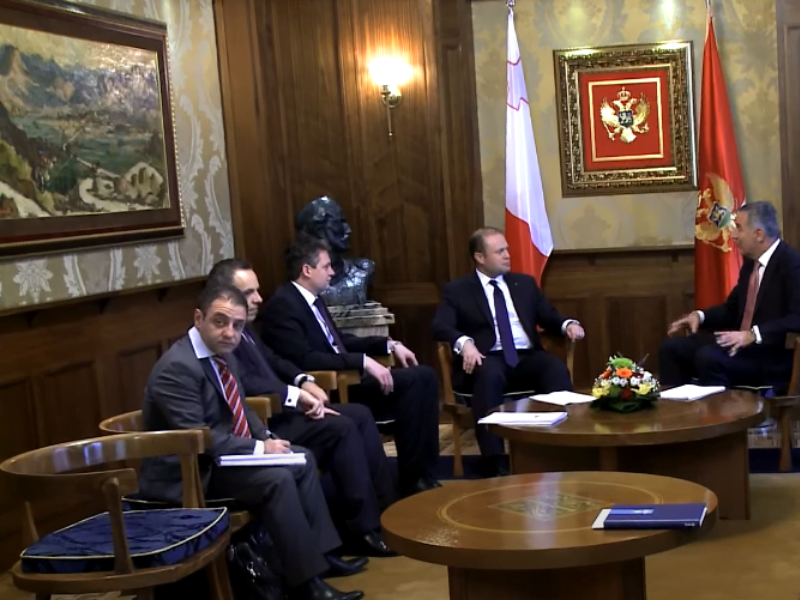Former Head of Communications at the Office of the Prime Minister Kurt Farrugia has denied being aware of any corruption in the Montenegro wind farm deal prior to revelations in the press despite being part of the Maltese government’s team present at high level meetings in the Balkan country.
Despite his denials when pressed by an independent inquiry Board on Friday, photographs of official visits to Montenegro published by The Shift show Farrugia’s presence at official meetings in January 2016, together with other government officials including Joseph Muscat, Konrad Mizzi and Keith Schembri.
Following The Shift’s revelations in March on the corruption-embroiled deal in Montenegro, Reuters revealed in June that prime murder suspect in the Daphne Caruana Galizia assassination case, Yorgen Fenech, received millions through his once-secret company in Dubai – 17 Black – through the wind energy deal in Montenegro, orchestrated by former energy minister Konrad Mizzi and Muscat’s former chief of staff.
The public inquiry was set up in December 2019, after the government spent more than two years stalling it. The Board composed of three Judges is investigating whether the 2017 assassination of Caruana Galizia could have been prevented and the measures needed to ensure this would not happen again.
When asked about the Montenegro farm deal and other revelations of corruption, Farrugia said he deemed the revelations “a pity” as the work he saw done “was done in good faith”. He said this offering no proof to counter the evidence in documents discovered in Montenegro by The Shift.
Meanwhile, the European Commission has encouraged a parliamentary debate and an investigation into the scandal.
PM @JosephMuscat_JM speaks about #malta investment in #montenegro, further cooperation in fields of tourism & health pic.twitter.com/Tg0BnkxmoH
— Kurt Farrugia (@KurtFarrugia) January 11, 2016
“The facts which came out, I absolutely did not know about, the only facts I knew (in the case of the Montenegro deal) was that Enemalta had an investment outside of Malta,” he said.
Caroline Muscat replies to Farrugia’s comment on ‘serious relationship’
Caruana Galizia’s lawyer Jason Azzopardi questioned Farrugia about decisions on media access taken by the government during his tenure, such as why there was a void of interviews with Muscat following the assassination and the lack of press invites to local media houses.
Farrugia denied the fact Muscat held back on interviews, even though this is a documented fact confirmed by a number of newsrooms. He said media houses could have familiarised themselves with the government’s schedule for the day from their website, which does not address requests for interviews or the exclusion of specific newsrooms. Yet Farrugia spoke of having a good relationship with members of the media.
The Shift’s founder has raised this exclusion before the Board. Yet Farrugia said, “the government does not pick who it communicates with”.
He said his working relationship with Caroline Muscat was “a serious one” with regular communication.
Reacting, Muscat said she was surprised that Farrugia claimed his boss had been open to interviews, or even answered regular questions by the press.
She referred to communication as having been severed following her role at The Times of Malta. She explained she first met Farrugia when, as Senior Journalist for the newspaper, she had revealed corruption in the Mark Gaffarena deal on a property in Old Mint Street, Valletta, being expropriated by the government.
Further meetings with Farrugia and his team were held when she was sent by her editors at The Times of Malta being told that Castille “had a good story”. She recalled at least one occasion when the front page of The Sunday Times of Malta was kept empty for the story even though it was unclear whether the story had any merit.
She returned and informed her editor that she would not write or put her name to the story. Muscat had questioned the story since it was the eve of local council elections and a candidate was being targeted on trumped-up charges. After hearing her arguments, the editor had agreed.
She also recalled the pressure she had faced when she had interviewed Phyllis Muscat, then Head of CHOGM, where it became clear that she was unfit for purpose. The journalist recalled having to give the full interview to the OPM to prove she had been true to fact.
Farrugia’s relationship with Daphne Caruana Galizia
Farrugia described his working relationship with Caruana Galizia as “courteous”. When questioned by the Board, he denied the OPM did not answer her questions following her revelations on Mizzi and Schembri.
Yet this was a reality faced by a number of other journalists reporting on the Panama Papers. Moreover, a number of libel suits were filed when the first stories started to be published in an attempt to silence journalists. These were eventually withdrawn when the Ministers involved were called to testify.
Following Farrugia’s testimony before the Board of Inquiry, Caruana Galizia’s sister, Corinne Vella, presented a dossier detailing a different reality to the one portrayed by Farrugia.
 The dossier contained open-source material concerning Farrugia in his role as editor of MaltaStar, as chief spokesperson for the Labour Party and as Head of Communications at the OPM, including campaigns and editorial lines.
The dossier contained open-source material concerning Farrugia in his role as editor of MaltaStar, as chief spokesperson for the Labour Party and as Head of Communications at the OPM, including campaigns and editorial lines.
One example was when Caruana Galizia’s face was put on a Party billboard, causing people to recognise her in the street and hurl even more abuse.
Vella presented excerpts from Caruana Galizia’s blog where, for example, she had said that Farrugia had not replied to her questions following the Panama Papers, but then would call her in the early hours of the morning about an article she had written on the government.

Vella also presented an interview with Caruana Galizia by the Council of Europe held only days before her assassination.
In the video, Caruana Galizia said she felt she was a “national scapegoat“. When there is a scapegoat, there is someone doing the scapegoating, she had added.
In her case it was the Labour Party, which had been doing it for 30 years, both when in opposition and in government, Caruana Galizia had said in the interview.
Government Panama Papers statements unverified
During the lengthy testimony, Farrugia was also questioned about the government’s public reaction following a number of allegations, including the Panama Papers expose in 2016.
The Board heard how the statements issued by the government following the revelations that had an impact across the globe and in which Mizzi and Schembri were initially named, were not verified. Instead, Farrugia relied on what the two involved had said, presenting it as the government’s stand.
“We used to go (sic) on the information given to us from the source,” he said.
“So if Konrad Mizzi gave you a version of events, would you verify this version?” the Board asked.
“No, I would stay (sic) on what they said. I would take the position of the government not of them exactly,” Farrugia replied.
The difference is unclear. Yet this was also the ‘government’s stand’ adopted on 17 Black – the company linked to kickbacks to Mizzi and Schembri on both the Electrogas and Montenegro deals.












